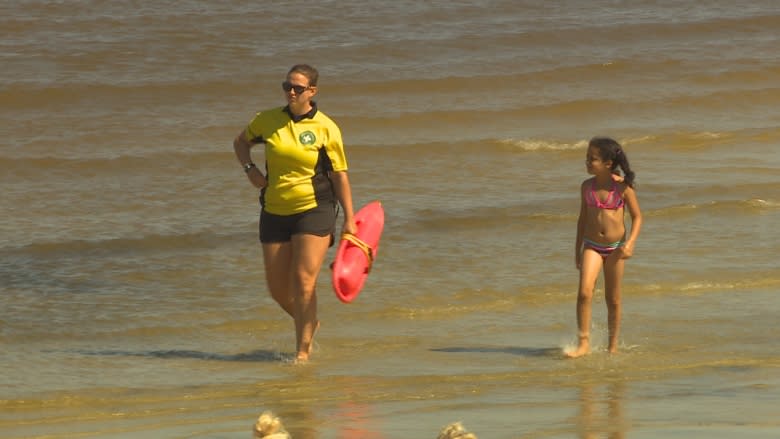Expand program that shares life-jackets at beach, safety review says
A provincial review of beach safety, prompted by two children drowning at Grand Beach last summer, calls for the expansion of a life-jacket sharing program, reviews of emergency protocols and some extra safety equipment, but no major changes to the beach safety officer program.
Currently, Manitoba beaches are not monitored by lifeguards. Instead, three of the province's lakes within provincial parks — Grand Beach, Winnipeg Beach and Birds Hill Park — are staffed with beach safety officers.
Those safety officers monitor the beaches, provide water safety advice to parents and assist with first aid and missing persons searches, but generally do not supervise swimmers in the water.
According to the report, 90 beach safety officers oversee nearly one million visitors to the three provincial park beaches each year, and while they are trained in crisis response and lifesaving, their role is to focus on education.
"The review has found that the [beach safety officer] program remains the best approach to addressing public safety with a strategic focus on water safety education," said Minister of Sustainable Development Cathy Cox in a statement.
"Encouraging visitors to participate in active supervision and alerting them to potentially life-threatening situations is the most effective way of ensuring a safe and fun visit to our beaches," she said.
The review, to be posted online Wednesday, calls for additional safety equipment and several changes to procedures, but remains strongly focused on the province's message of public education and awareness.
Some of the improvements that will be implemented immediately include the expansion of the life-jacket borrowing program, currently offered at St. Malo Provincial Park, through which life-jackets are made available to beachgoers for free.
This summer, life-jackets will be offered at Birds Hill Park as well as at Bakers Narrows and Gyles Lake.
The report also calls for improvements to water safety signage at Birds Hill and Grand Beach, which are in the process of being implemented.
Safety equipment will also be added, including a watercraft to be used at Birds Hill Park for monitoring swimmers from the water, buoy markers to keep swimmers from accessing unmanned areas, and additional automated external defibrillators to accommodate incidents where more than one person may need assistance.
The province is also asking beach staff to be trained to create a command centre on the beach where an incident is occurring to improve communications, as well as the creation of a kit with necessary tools like whistles, first-aid supplies, and a list of the nearest locations of defibrillators.
Masks, goggles and swimming fins will also be provided to safety officers.
Lifesaving Society wants lifeguards at beaches
The Lifesaving Society — a charitable organization that works to prevent drowning and water-related injury — said it welcomes the report but would still like to see lifeguards on Manitoba's beaches.
"We're glad to see that the province has conducted a review after the incidents last year," Christopher Love, co-ordinator of the Water Smart program for the Lifesaving Society's Manitoba branch, told CBC.
"We support the increase in public education opportunities. The recommendations in here, from what I've seen so far, are a little light on exact specifics on every single thing that's going to happen for increasing that."
But the society considers lifeguards "the gold standards for safety supervisions at lakes, beaches and pool," he added.
"We do have regulations in Manitoba that require lifeguards for swimming pools but there are no such regulations for natural bodies of water. And we continue to advocate for the provision of lifeguards in locations where people are swimming and amenities are being made available to make that swimming more enjoyable to people," Love said.
"We would continue to advocate for lifeguards on the beaches that will provide that additional level of safety supervision," he said.
"That would be something that, if our feedback was requested on those specific points from provincial government, we would offer forward."
No additional resources for new Canadians
After the drownings last summer, concerns were raised about access to swimming lessons for people who had recently immigrated to Canada, who are less likely to know how to swim.
The report mentions working with organizations "to promote and improve water safety initiatives that target new Canadians," but makes no mention of anything specific that will be implemented.
Birds Hill Park will also be piloting the use of sonar technology during water searches to identify objects in the water and mark the GPS co-ordinates of search subjects, in a program that will be evaluated at the end of the season.
The review also recommends several changes to various water rescue and emergency protocols, as well as improved communications between command centres and outside agencies, like the RCMP and STARS.



